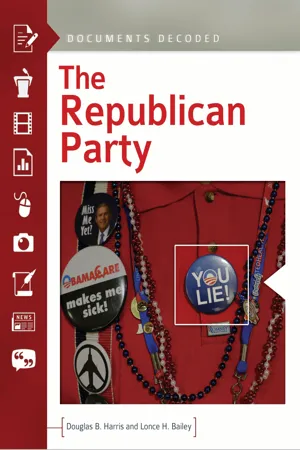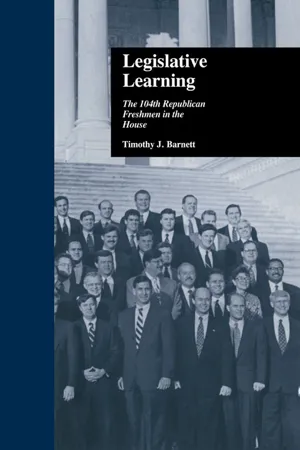Politics & International Relations
Contract with America
The Contract with America was a political manifesto released by the Republican Party during the 1994 midterm elections. It outlined a set of policy proposals aimed at reducing the size and scope of the federal government, balancing the budget, and promoting conservative values. The Contract helped Republicans win control of both the House of Representatives and the Senate.
Written by Perlego with AI-assistance
Related key terms
Related key terms
1 of 4
Related key terms
1 of 3
3 Key excerpts on "Contract with America"
- eBook - ePub
After Welfare
The Culture of Postindustrial Social Policy
- Sanford F. Schram(Author)
- 2000(Publication Date)
- NYU Press(Publisher)
1Contracting America
The Cycle of Representation and the Contagion of Policy DiscourseSince I took office, I have worked to craft a new social contract. —President Bill Clinton, July 14, 1999The “Contract with America” was proposed by Republican congressional candidates during the 1994 elections. A superficial campaign device, this conservative document became the basis for rewriting the liberal social contract that has served as the foundation of the social welfare state since the New Deal of the 1930s. Within the framework of the ephemeral “Contract,” Congress passed and President Clinton signed into law the Personal Responsibility and Work Opportunity Reconciliation Act of 1996. This law abolished the federal entitlement for poor families by repealing the Aid to Families with Dependent Children program that was originally enacted with the Social Security Act of 1935.1While the significance of the 1996 welfare reform law is not to be underestimated, in many important respects the problems of the conservative Contract lie not with the fact that it promoted legislation that rescinded a program of sixty years’ standing but rather with the way it has reinscribed the relations of power implicit in liberal discourse more generally. As reproduced in the New York Times shortly after the November 1994 elections, the “Contract with America” put forth ten promises made by Republican congressional candidates concerning legislative action they would undertake during the first hundred days of the 104th Congress. Here are the Republicans’ promises “in their own words,” to quote the New York Times - eBook - ePub
The Republican Party
Documents Decoded
- Douglas B. Harris, Lonce H. Bailey(Authors)
- 2014(Publication Date)
- ABC-CLIO(Publisher)
Jacksonian Democratic roots to the base of the Republican Party. Second, the use of Speaker Martin’s gavel is a stark reminder of Gingrich’s place in history as the first Republican Speaker in 40 years. After 40 years in the minority, many Republicans joked that Gingrich was the “Moses” who led them to the promised land of majority status.. . . I want to read just a part of the Contract with America. I don’t mean this as a partisan act, but rather to remind all of us what we are about to go through and why. Those of us who ended up in the majority stood on these steps and signed a contract, and here is part of what it says:On the first day of the 104th Congress the new Republican majority will immediately pass the following reforms aimed at restoring the faith and trust of the American people in their government: First, require all laws that apply to the rest of the country also to apply equally to the Congress. Second, select a major, independent auditing firm to conduct a comprehensive audit of the Congress for waste, fraud or abuse. Third, cut the number of House committees and cut committee staffs by a third. Fourth, limit the terms of all committee chairs. Fifth, ban the casting of proxy votes in committees. Sixth, require committee meetings to be open to the public. Seven, require a three-fifths majority vote to pass a tax increase. Eight, guarantee an honest accounting of our federal budget by implementing zero baseline budgeting. . . .Then we go a step further. I carry the T.V. Guide version of the contract with me at all times.The “Contract with America” was an important campaigning document used by Republicans in the 1994 elections. In addition to promising this series of internal congressional reforms (frustrations built up over decades in the minority), the contract also promised that the Republicans would hold floor votes on 10 different legislative proposals aimed at budget and tax policy, crime policy, welfare, tort reform, and other reform policies. In addition to being signed by most Republican candidates for Congress, Republicans also advertised their policy agenda broadly including inTV Guide - eBook - ePub
Legislative Learning
The 104th Republican Freshmen in the House
- Timothy J. Barnett(Author)
- 2012(Publication Date)
- Routledge(Publisher)
CHAPTER 6 Freshmen and Principles The Contract as MissionThe 104th freshman class is a maverick class with an abundance of members who will fight for their convictions even at a clear cost to self-interest.(Freshman chief of staff)The Contract with America was like a contract between the freshmen—at least, that is how some of them seemed to look at it.THE EVOLUTION OF THE CONTRACT(Freshman press secretary)The GOP’s 1994 “Contract with America” created a mission statement upon which conservative Republicans could declare a meeting of their minds. It included organizational reform for Congress, as well as a policy platform couched in the language of conservative principles. House Republicans used the Contract in an instrumental sense as a vehicle to enhance unity of purpose. Enhanced agreement made it easier for Contract proponents to portray policy planks in the Contract platform as fundamental principles. In a sense, conservative House Republicans came to understand principles as ideals with wide support among conservative ideologues.Although a few House Republicans expressed reservations about the Contract, most were eager to sign on. Following the 1994 congressional elections, Newt Gingrich declared that Republicans would read the Contract on the floor every day until they accomplished it (Healey 1994). Gingrich also announced that the GOP House victory created a mandate for the Contract. Yet, polls showed that only one-fourth of Americans were aware of the Contract (Drew 1996, 33–34). There was also another problem. The idea of a “Contract” with “America” seemed a little strong to some legislators after the public relations ordeal House Republicans went through in trying to flesh it out and implement it.1
Index pages curate the most relevant extracts from our library of academic textbooks. They’ve been created using an in-house natural language model (NLM), each adding context and meaning to key research topics.
Explore more topic indexes
Explore more topic indexes
1 of 6
Explore more topic indexes
1 of 4


